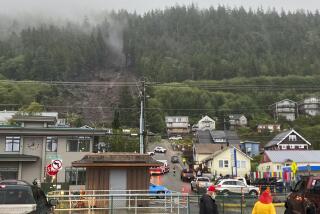Alaska money blizzard may end as oil’s plunge threatens payouts
BETHEL, Alaska _ Alaska is poised to alter its social contract with people like Paul Alexie for the first time in its 56-year statehood.tmpplchld Oil riches have ensured that the 23-year-old Yupik Eskimo from Bethel doesn’t pay state sales or income taxes. Instead, Alaska pays him. He’ll use $2,072 that lands in his bank account this week to defray $8 gallons of milk, $6 gasoline and a monthly $800 heating bill.tmpplchld With crude prices less than half what they were a year ago, the state is losing millions daily and Alexie’s big payout may shrink dramatically. The dividends come from a fund fed by oil revenue, and lawmakers are considering applying a portion of that money to services. The legislature is readying for a fierce debate over capping payments and levying taxes.tmpplchld “It’s already cold and hard to live here,” Alexie said last week as he prepared to remodel stilt homes atop shifting permafrost 400 miles 644 kilometers west of Anchorage. “Taxes will make it much harder.”tmpplchld Other mineral-rich states are also feeling pain. In the next two years, oil’s plunge will lead to wage reductions of $975 million and 13,000 lost jobs in Colorado, and a $4 billion reduction in tax revenue in North Dakota, reports from budget officials show. It’s expected to slow job growth in Texas to as little as 1 percent in 2015, according to the Federal Reserve Bank of Dallas.tmpplchld Oil hovered near $45 a barrel in September, down from $107 in June 2014, a level low enough to prompt Royal Dutch Shell Plc on Monday to abruptly call off its $7 billion Arctic drilling project in waters off Alaska.tmpplchld In an attempt to ensure long-haul prosperity, Alaska Gov. Bill Walker called a legislative session for Oct. 24 to expedite a pipeline that would cost as much as $65 million to pump gas from the North Slope for export to Asia.tmpplchld As for the short term, the first-term independent is preparing to release a budget proposal in coming months that could limit direct payouts to residents.tmpplchld Alaskans bear the nation’s lowest tax burden and many are adamant that they are entitled to this week’s record dividend from earnings on a $51.4 billion permanent fund. The $1.3 billion payout outpaced oil-tax revenue and is more than the state spent on schools this year. As some of the 644,000 recipients indulged in souped-up snowmobiles or plane tickets to sunny Phoenix, officials said a reckoning is nigh.tmpplchld “Our oil production is coming down at the same time our population is increasing,” said Pat Pitney, director of the Office of Management and Budget. “We have to change the system. We need to bring taxes closer to what they are in other states.”tmpplchld Alaska is the most energy-dependent state, with oil taxes composing 90 percent of its general fund. A record $3.2 billion deficit in fiscal 2016 led legislators to cut $88 million from health and social services and $20 million from corrections and universities. Teachers and state troopers were dismissed. Billions in capital projects went on indefinite hold.tmpplchld The state is staring down a projected $3.2 billion deficit for 2017. It’s draining $9 million a day from a $9 billion rainy-day fund, Pitney said during an interview in Palmer, an agricultural community 43 miles northeast of Anchorage.tmpplchld The budget director joined Walker, who spoke to residents about the urgency of finding new ways to make money. Among those are exporting produce _ cabbages can grow to 127 pounds and carrots that the governor said are eight times sweeter than average.tmpplchld Among the administration’s priorities is tapping the permanent fund’s earnings for about $1.5 billion a year. That would require capping the dividend, which is based on a five-year average of investment income.tmpplchld Established in 1976 by constitutional amendment, the fund reserves at least 25 percent of mineral royalties and lease payments for investments and has distributed $23 billion to Alaskans.tmpplchld tmpplchld “The funds we have are unprecedented in Alaska’s history,” Walker said in an interview in Anchorage. “Our biggest assets are our assets.”tmpplchld Using these earnings and capping the dividend were the most popular options to fix the shortfall among voters in an August poll.tmpplchld Businesses are concerned a standoff over the deficit when the legislature convenes in January will set off a recession.tmpplchld “Anybody who says we are not going to have a modest downturn is foolish,” said Bill Popp, president of the Anchorage Economic Development Corp., which encourages economic growth and diversity. “All we can do is make sure it’s not deeper than it should be.”tmpplchld Already, the state’s top credit rating is in jeopardy. Citing reliance on oil taxes and government employment, as well as the political challenges to creating new revenue streams, Moody’s Investors Service revised its outlook in December to negative from stable. Standard & Poor’s followed suit in August.tmpplchld Meanwhile, Pitney traverses the largest state, talking taxes with residents who live in cities like Fairbanks, Juneau and Anchorage and those who rely on salmon and berries for subsistence in the interior and Arctic.tmpplchld The administration is considering a tax on corporations, mining, fishing and gasoline to ensure no group pays disproportionately, she said.tmpplchld The debate in the Republican-controlled legislature will come in an election year when all 40 House of Representatives seats are on the ballot, and half of the 20-member Senate.tmpplchld “A lot of legislators don’t want to get their constituents mad at them for putting in a tax,” said state Rep. Steve Thompson, a Fairbanks Republican who co-chairs the Finance Committee. “We have no choice.”tmpplchld ___tmpplchld (With assistance from Lauren Etter in Austin.)tmpplchld ___tmpplchld (c)2015 Bloomberg Newstmpplchld Visit Bloomberg News at www.bloomberg.comtmpplchld Distributed by Tribune Content Agency, LLC.tmpplchld
More to Read
Sign up for Essential California
The most important California stories and recommendations in your inbox every morning.
You may occasionally receive promotional content from the Los Angeles Times.










